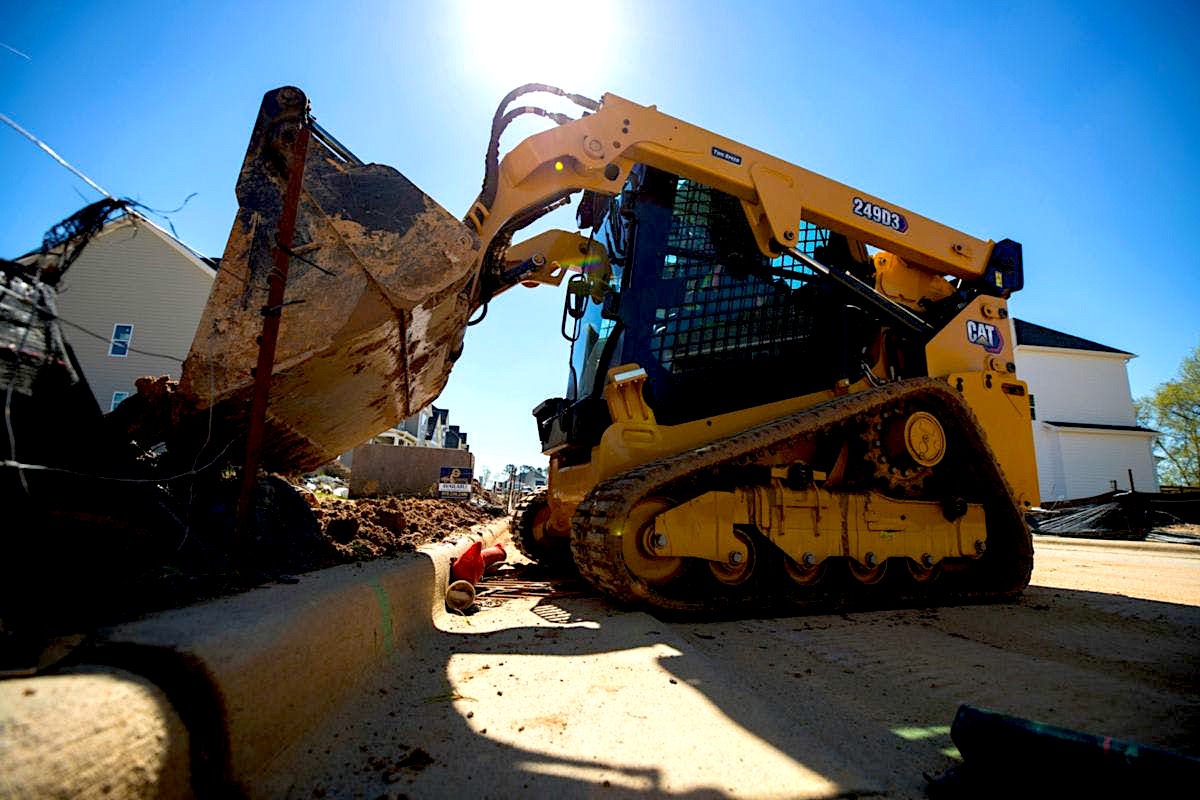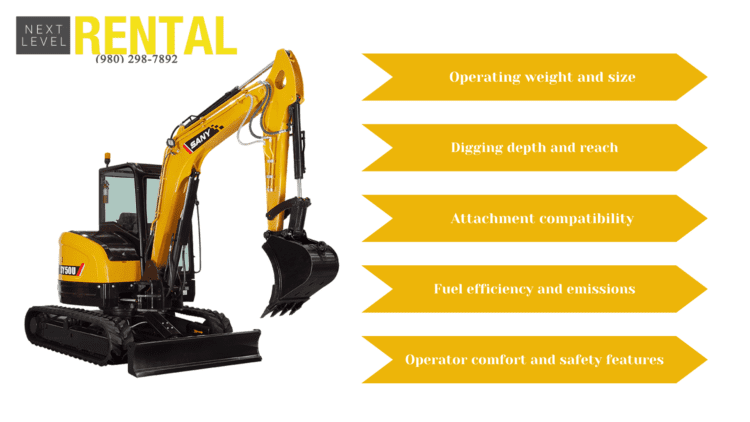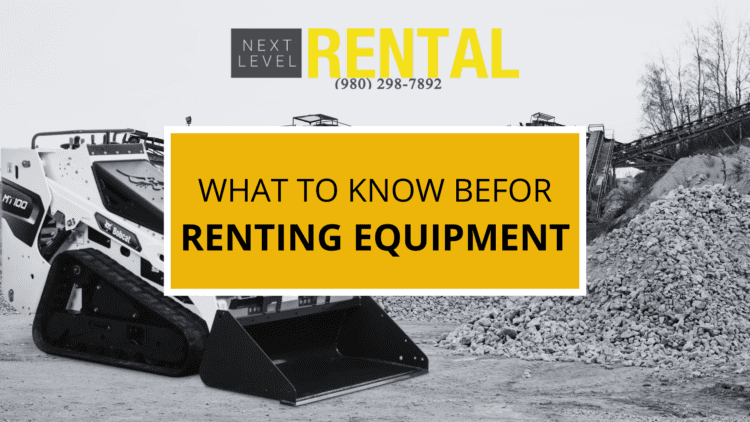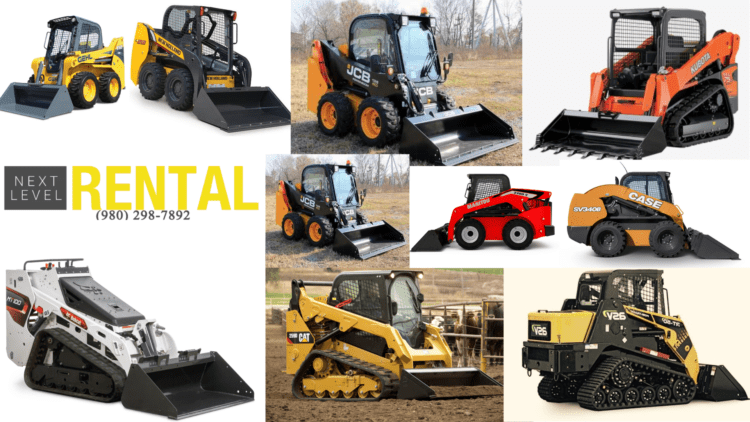Mini excavators, also known as compact excavators, have become indispensable tools in the construction, landscaping, and utility industries. These versatile machines offer a myriad of benefits, including their small footprint, ease of operation, and ability to perform a wide range of tasks. Whether you’re a seasoned professional or a novice operator, understanding the ins and outs of mini excavators is essential for maximizing their utility and efficiency. Here are 10 key things to know about mini excavators.
The Basics Things To Know About Mini Excavators
- What Makes Up a Mini Excavator
Mini excavators typically consist of a chassis, boom, arm, and bucket. They are powered by diesel engines and equipped with hydraulic systems for controlling movement and attachments. Most models feature tracks for mobility, allowing them to navigate various terrains with ease.
- The Size Category of a Mini Excavator
Important things to know about mini excavators. Mini excavators are categorized by their operating weight, typically ranging from 1 ton to 10 tons. These compact machines are designed to work in tight spaces where larger excavators cannot access, making them ideal for urban construction sites, landscaping projects, and residential developments.
Common Jobs For Mini Excavators – Important Things To Know About Mini Excavators
Mini excavators are incredibly versatile and can be used for a wide range of tasks, including:
- Digging trenches for utilities such as water, sewer, and electricity.
- Excavating foundations for buildings and structures.
- Landscaping and grading work, including the installation of retaining walls and drainage systems.
- Demolition and removal of small structures.
- Loading and unloading materials.
- Clearing land and vegetation.
Choosing the Right Mini Excavator: Factors
Important things to know about mini excavators. When selecting a mini excavator for a specific job, several factors should be considered:
- Operating weight and size. Choose a machine that can maneuver within the confines of the work area.
- Digging depth and reach. Ensure the excavator’s capabilities match the requirements of the project.
- Attachment compatibility. Check if the machine can accommodate the necessary attachments for the job.
- Fuel efficiency and emissions. Opt for models that meet environmental standards and offer fuel-efficient operation.
- Operator comfort and safety features. Prioritize machines that provide a comfortable working environment and incorporate safety features such as ROPS (Roll Over Protective Structure) and FOPS (Falling Object Protective Structure).
The Mini Excavator VS Standard Excavators
Things to know about mini excavators – A Smaller, Lighter Heavy Machine
Mini excavators offer several advantages over standard excavators, including:
- Greater maneuverability in confined spaces.
- Reduced ground pressure, minimizing damage to delicate surfaces.
- Lower transportation costs due to their compact size and lighter weight.
- Easier operation for novice operators.
Beneficial for Busy or Compact Project Sites
Things to know about mini excavators – mini excavators excel in environments where space is limited or access is restricted, such as:
- Urban construction sites with tight quarters and limited access points.
- Residential properties where traditional excavators may cause disruption or damage.
- Landscaping projects that require precision and minimal disturbance to existing features.
A Diverse Heavy Machine – Things To Know About Mini Excavators
Despite their small size, mini excavators are capable of performing a wide range of tasks, thanks to their versatility and compatibility with various attachments. Some common attachments include:
- Augers for drilling holes.
- Hydraulic breakers for demolition work.
- Grapples for handling materials.
- Buckets of various sizes for digging and loading.
Mini Excavators Can Improve Project Efficiency
Another point of things to know about mini excavators. By streamlining operations and maximizing productivity, mini excavators can significantly improve project efficiency. Their compact size and agile maneuverability enable operators to work more efficiently in tight spaces, reducing the need for manual labor and speeding up project timelines. Additionally, their versatility allows for seamless transitions between different tasks, minimizing downtime and maximizing utilization.
Attachments for a Mini Excavator
Another point of things to know about mini excavators. Mini excavators can be equipped with a wide range of attachments to enhance their capabilities. Some popular attachments include:
- Hydraulic thumbs for improved grasping and lifting.
- Trenching buckets for digging narrow trenches.
- Grading blades for leveling and grading surfaces.
- Hydraulic compactors for compacting soil and other materials.
- Tree shears for clearing vegetation.
Manufacturers & Models of Mini Excavators
Another point of things to know about mini excavators. Several manufacturers produce mini excavators, each offering a range of models tailored to different applications and requirements. Some prominent manufacturers include:
CATerpillar
Caterpillar offers a comprehensive lineup of mini excavators known for their durability, performance, and advanced features. Models such as the Cat 300 series are popular choices for a wide range of construction and landscaping projects.
Yanmar
Yanmar is renowned for producing high-quality mini excavators that combine power, efficiency, and versatility. Models like the Yanmar ViO series are favored by contractors and operators worldwide for their reliability and performance.
Bobcat
Bobcat manufactures a diverse range of mini excavators designed for maximum productivity and ease of operation. The Bobcat E10 and E20 models are compact yet powerful, making them ideal for tight spaces and demanding tasks.
JCB
JCB mini excavators are known for their innovative design, advanced technology, and rugged construction. The JCB 18Z-1 and 19C-1 models offer exceptional performance and versatility, making them popular choices for various applications.
Hitachi
Hitachi mini excavators are synonymous with durability, efficiency, and performance. The Hitachi ZX17U-5 and ZX26U-5 models are engineered to deliver superior productivity and reliability in diverse working conditions.
Potential Hazards & Safety Protocols for Mini Excavators
Another point of things to know about mini excavators. While mini excavators offer numerous benefits, they also pose certain hazards that operators should be aware of. Some potential hazards include:
- Rollover accidents due to unstable terrain or improper operation.
- Entanglement or crush injuries from moving parts or hydraulic systems.
- Striking underground utilities or structures during excavation work.
- Overhead hazards from falling objects or debris.
Important things to know about mini excavators to mitigate these risks, operators should adhere to strict safety protocols, including:
- Completing comprehensive training on the safe operation of mini excavators.
- Conducting pre-operation inspections to identify potential hazards or defects.
- Using appropriate personal protective equipment (PPE), including helmets, gloves, and safety glasses.
- Following manufacturer guidelines for equipment operation and maintenance.
- Avoiding unsafe practices such as overloading the machine or operating on steep slopes.
Find the Best Small Excavators
For professionals and homeowners seeking dependable and effective mini excavators, Next Level Rental stands as your reliable ally. Our inventory boasts a varied array of high-caliber mini excavators sourced from reputable manufacturers such as CAT, Bobcat, ASV, Sany. With a dedicated team at your service, we are committed to delivering tailored assistance and expert advice to aid you in selecting the ideal machine for your requirements. Reach out to us today to delve into our range of mini excavator options and explore how we can assist you in realizing your project objectives.
Conclusion
In conclusion, mini excavators are versatile, powerful, and essential tools for a wide range of construction, landscaping, and utility projects. By understanding their capabilities, features, and safety protocols, operators can maximize the efficiency and effectiveness of these compact machines, ultimately contributing to the success of their projects. Whether you’re digging trenches, grading land, or demolishing structures, a mini excavator is a valuable asset that can help you tackle tasks with precision and confidence.
FAQ
What Is The Typical Lifespan Of A Mini Excavator?
Another point of things to know about mini excavators. The lifespan of a mini excavator depends on various factors, including usage, maintenance, and operating conditions. With proper care and maintenance, a well-maintained mini excavator can last for thousands of hours of operation.
What Kind Of Maintenance Do Mini Excavators Require?
Another point of things to know about mini excavators. Mini excavators have become indispensable tools in various industries, from construction and landscaping to agriculture and utility work. These compact machines offer versatility and efficiency in completing a wide range of tasks. However, like any mechanical equipment, mini excavators require regular maintenance to ensure optimal performance, longevity, and safety. Here, we delve into the essential maintenance requirements for mini excavators.
- Daily Inspections. Before starting work each day, operators should conduct visual inspections of the mini excavator. This includes checking for leaks, loose bolts, damaged hoses, and any signs of wear or damage. Verify the functionality of lights, signals, and safety features such as seat belts and emergency stop buttons.
- Lubrication. Proper lubrication is critical for the smooth operation of mini excavators. Grease all grease fittings according to the manufacturer’s recommendations. Regularly inspect and lubricate track chains, rollers, idlers, and sprockets to prevent premature wear and ensure proper track tension.
- Fluid Checks. Check fluid levels regularly, including engine oil, hydraulic fluid, coolant, and fuel. Maintain proper levels to prevent damage to vital components. Inspect hydraulic hoses and connections for leaks or damage, and promptly address any issues to prevent hydraulic system failure.
- Air Filter Maintenance. Clean or replace air filters as needed to ensure the engine receives clean air for combustion. Clogged air filters can lead to decreased engine performance and increased fuel consumption.
- Track Maintenance. Inspect tracks for signs of wear, damage, or misalignment. Adjust track tension according to the manufacturer’s specifications to prevent premature wear and ensure proper traction. Remove debris lodged between track links to prevent damage to the undercarriage components.
- Cooling System Maintenance. Regularly clean debris, dirt, and other contaminants from the radiator and cooling fins to maintain proper engine temperature. Check coolant levels and condition regularly, and flush the cooling system as recommended by the manufacturer.
- Electrical System Checks. Inspect wiring, connectors, and battery terminals for corrosion, damage, or loose connections. Clean and tighten connections as needed to ensure reliable electrical operation.
- Regular Servicing. Schedule routine servicing and inspections with qualified technicians according to the manufacturer’s recommended intervals. Service intervals typically include tasks such as engine tune-ups, filter replacements, and thorough inspections of critical components.
- Operator Training. Properly trained operators are essential for the safe and efficient operation of mini excavators. Ensure operators are familiar with the machine’s controls, safety features, and maintenance procedures.
- Storage and Protection. Store mini excavators in a clean, dry environment to prevent corrosion and damage from the elements. Cover the machine when not in use to protect it from dust, moisture, and UV exposure.
Regular maintenance is crucial for maximizing the lifespan and performance of mini excavators. By following these maintenance guidelines and adhering to manufacturer recommendations, operators can keep their mini excavators running smoothly and efficiently, ensuring they remain reliable assets on the job site for years to come.
Can A Mini Excavator Be Used On Slopes?
Another point of things to know about mini excavators. Yes, mini excavators can be used on slopes, but operators should exercise caution to prevent rollover accidents. It’s essential to adhere to safe operating practices and avoid working on excessively steep or unstable terrain.
Do I Need A Special License To Operate A Mini Excavator?
Another point of things to know about mini excavators. The requirements for operating a mini excavator vary depending on the jurisdiction and the specific machine’s specifications. In many cases, operators are required to undergo training and obtain certification to operate heavy equipment safely and legally.
Can I Rent A Mini Excavator, Or Do I Have To Buy One?
Another point of things to know about mini excavators. Many equipment rental companies offer mini excavators for short-term or long-term rental. Renting a mini excavator can be a cost-effective option for contractors and homeowners who require temporary access to heavy machinery without the upfront investment of purchasing.




